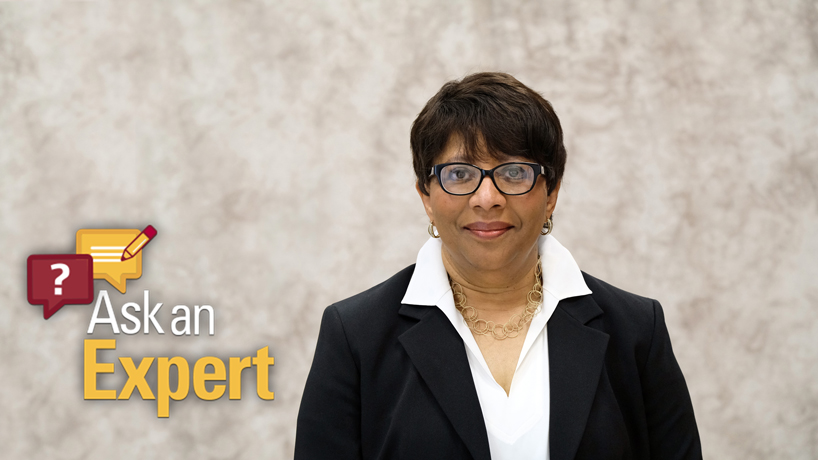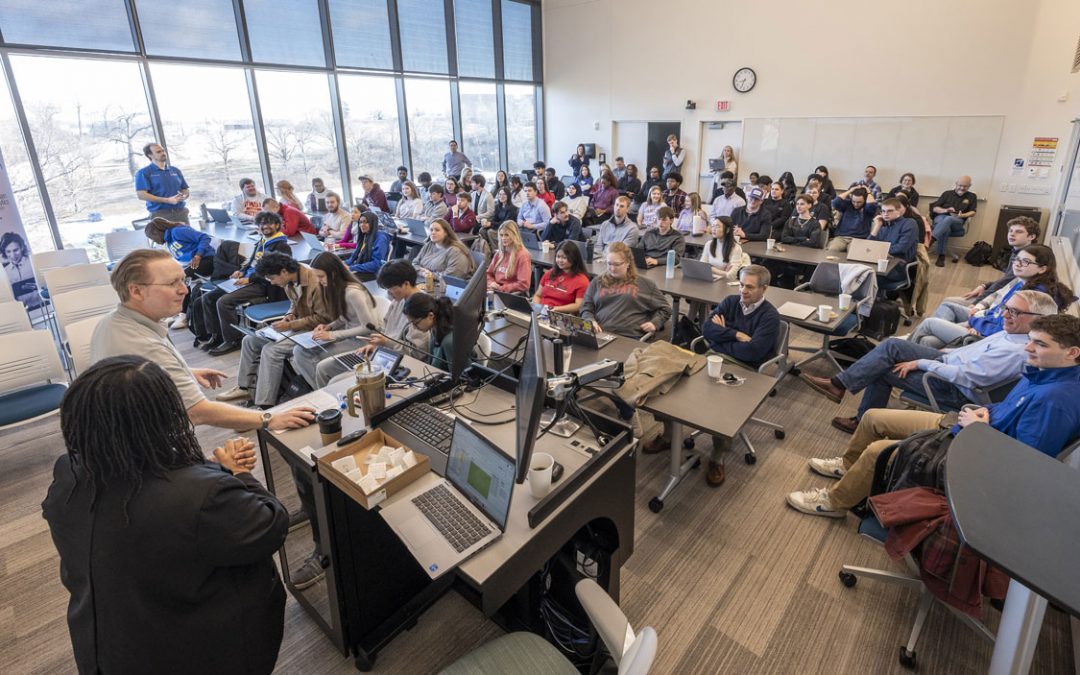
Barbara Graham, an associate professor of political science, specializes in law, courts and politics and teaches graduate and undergraduate courses on the Supreme Court. (Photo by August Jennewein)
The United States Senate is gearing up for a monthslong battle over the confirmation of Brett Kavanaugh to serve on the Supreme Court.
President Donald Trump nominated him for the post during a July 9 announcement in the East Room at the White House.
Kavanaugh’s positioned to become the 114th person to serve on the nation’s highest court, taking the place of retiring Justice Anthony Kennedy.
But he first must lock up majority support in Congress’ upper chamber before he can join John Roberts, Clarence Thomas, Samuel Alito, Neil Gorsuch, Ruth Bader Ginsburg, Stephen Breyer, Sonia Sotomayor and Elena Kagan on the bench.
Barbara Graham, an associate professor of political science at the University of Missouri–St. Louis, specializes in the area of law, courts and politics and teaches graduate and undergraduate courses on the Supreme Court.
In the latest installment of the “Ask an Expert” series, UMSL Daily spoke to Graham about what’s in store for Kavanaugh in the confirmation process and why that process seems to have become more contentious over the past two decades.
After the initial coverage of Kavanaugh’s nomination, the Supreme Court seems to have moved to the back of people’s minds while the news media focuses on more pressing events. What is happening in the confirmation process at this point?
Once the date for the confirmation hearings has been announced, then the activity will pick up tremendously. People are still reading his writings, and interest groups – they’re still strategizing. This period prior to the confirmation hearings is to get – if you want to say “dirt” – get every piece of information that they can. I’m talking about those on the opposition to the Kavanaugh nomination. Traditional liberal interest groups, they also do “background checks,” and they do that by reading everything he’s written, just going back as far as they possibly can to get whatever it is that they’re looking for that they think might cause additional opposition or that might rally the base. It has to be more than ideology or a position on issues – something else that might reflect negatively on his qualifications. Typically, there is a presumption of confirmation of Supreme Court nominees. About 20 percent have not been confirmed, so that there is a presumption of confirmation.
How long does the process typically last from the time a nominee is put forward?
Typically, about three months. If the announcement is made in the summer, right at the end of the Court’s term in June, confirmation hearings are generally scheduled in September or October. That’s what happened with the John Roberts nomination when Sandra Day O’Connor announced her retirement. They were scheduled in September. Although Mitch McConnell, who’s the Senate Majority Leader, has not announced when they’re going to be held, I did read that he made a statement that he’s looking for September. There’s a reason for that. The Supreme Court’s term begins the first Monday in October. You want a new justice confirmed before the first Monday in October because they hear cases. If they’re not on the court, they cannot participate in those cases. So I suspect Mitch McConnell and Chuck Grassley, who is the chair of the Senate Judiciary Committee, they will work really hard to try to get him confirmed prior to the beginning of the Court’s term.
You read stories about former Arizona Sen. Jon Kyl acting as Kavanaugh’s “Sherpa.” What goes into doing that job and how important is it?
It’s important to the nominee. What Jon Kyl should be doing – because Kavanaugh’s going to walk around to the senators’ offices – is giving Kavanaugh the skinny on these people: what they think, how they think, how you should approach these people. He’s really giving basically some important background information about the senators. It’s impossible for a Supreme Court nominee to get to know all of the senators and, in particular, the Republican senators. The nominee just would not have time to do his or her homework on these individuals, and a nominee wants to make a good impression. So that’s the role of the Sherpa, just to sort of fill in the gaps on the kinds of issues senators care about.
There already have been senators say they don’t want to meet with Kavanaugh. Is that unusual? Does every senator typically meet with every nominee?
Depending on schedules or whatnot. Neil Gorsuch, accompanied by former Sen. Kelly Ayotte, had about 80 meetings with senators prior to the confirmation hearing. He will make his rounds. Even with respect to the Dems, he will make his rounds to senators. Whether he will meet with all of them, they’re in and out and about these days, but the goal is to meet with many of them because they all have questions they want to ask the nominee prior to the hearings. That’s what they use that time for. I certainly can imagine that the Dems will want to meet with him prior to the hearings. It’s personal, but they do ask questions about their philosophy and what they think about a wide range of issues. They do take it seriously.
As these processes have gotten more contentious, how much pressure do leaders of a particular party place on their colleagues to hold ranks?
It’s an interesting question. Heidi Heitkamp of North Dakota, Joe Manchin of West Virginia and Joe Donnelly of Indiana, they all voted for Neil Gorsuch. Now, that replacement was not as contentious as this one, and I suspect Sen. Chuck Schumer will try to, in Congressional language, whip them into shape on this issue. The problem is numbers. Even if Schumer were successful to get those three on board, he still needs two Republicans to cross over, and there’s been a lot of focus on Lisa Murkowski of Alaska as well as Susan Collins of Maine. I don’t see them not voting for him unless something comes up that’s significant. Collins has praised him in terms of qualifications. I just don’t see Collins or Murkowski abandoning the Republicans on this nomination. There’s a lot of politics at stake.
What are the big questions you expect the hearings to focus on?
The Dems will be the more aggressive questioners, and they will focus, in all likelihood, on key social issues where Justice Kennedy voted with the liberal bloc of justices. Kennedy was a very conservative justice, but on some key issues, he voted with the four liberal justices.
So “Roe v. Wade,” they’re going to try to pin him down. As a Court of Appeals judge, just the past year, he wrote a dissenting opinion about an unaccompanied minor in her attempts to obtain an abortion. The full panel of the D.C. Circuit ruled in her favor, but he dissented and in rather strong language in talking about “abortion on demand” and how the court is creating rights for undocumented minors. That’s something that’s in writing.
They will focus on LGBTQ rights, gay rights. Justice Kennedy wrote all of those opinions, including the same-sex marriage opinion. We don’t know Kavanaugh’s position on an issue like that.
He’s a judge on the U.S. Court of Appeals for the D.C. Circuit. It’s based in Washington, D.C., and that’s typically an administrative law court because all of the main federal agencies are headquartered in D.C. If you’re suing a governmental agency, those are the kinds of cases that the D.C. Circuit typically takes. It doesn’t take a lot of social issues, not as many as some of the other circuits, so there’s reason why we don’t know a lot about how he would vote in some of these issues.
Affirmative action in terms of the use of race in university and college admissions is another issue. Justice Kennedy did somewhat evolve on that issue, but he upheld the use of race as an admissions factor, narrowly, but he did vote with the liberal bloc.
These are all 5-4 decisions, so that will definitely be on the Dems’ list of questions.
Also environmental regulations. Kennedy, although he could go either way, he did vote with the liberals on some of those. Kavanaugh has decided cases that have been more pro-business and anti-regulation with respect to environmental protections.
Obamacare, what’s left of it. He did vote in a case, “Priests for Life v. U.S. Department of Health & Human Services,” that Obamacare’s requirement for contraceptive coverage violated the religious liberty of nonprofit organizations, so he’s likely to see more support for religious liberty-type concerns with respect to regulations.
Isn’t there a playbook at this point for how a nominee can avoid getting pinned down on a particular issue? How forthcoming does someone have to be in answering questions before the committee?
A political scientist recently released a study that said Neil Gorsuch was the most evasive justice in answering questions before the committee. The problem with Kavanaugh is that he’s written so many opinions. He’s written almost 300 opinions, and he has published law review articles. He might be forced to explain what he meant, so he may have a more difficult time evading questions just simply because of his numerous opinions, law review articles and Senate Democrats’ request for documents when he worked in the George W. Bush administration.
Conventional wisdom points to this being a contentious fight, continuing a recent trend. Where do you believe that trend originated?
The process really broke down after President Reagan nominated Robert Bork to succeed Justice Lewis Powell in the 1980s, and he was not confirmed for ideological reasons. Bork was a very strong, conservative ideologue, and in many ways, he was replacing a swing justice such as Kavanaugh is replacing a conservative swing justice, clearly to shift the court even further to the right. It was a contentious nomination, and that was the point in time in which interest groups came out of the woodwork. We saw for the first time television ads against a nomination. Now, we think that’s just par for the course, but it started with the Bork nomination, and Republicans never, never forgave the Dems for rejecting someone that they saw was very qualified simply on ideological grounds. And Roe was contentious then.
Even after the Bork nomination and the battle over Clarence Thomas, Bill Clinton’s two nominees – Ginsburg and Breyer, received 96 and 87 votes in support of their nominations.
Those days are gone. You also have to consider the political party of the president and the partisan composition of the Senate as well. It’s easier for a president to get a nomination through if the Senate is of the same party and so forth. Those were the last two. Roberts, Alito, the range was simply closer in terms of voting purely along partisan line, and that’s what we would expect. This is attributed to the hyperpolarization and hyperpartisanship that exists in Congress today, including the Senate.














